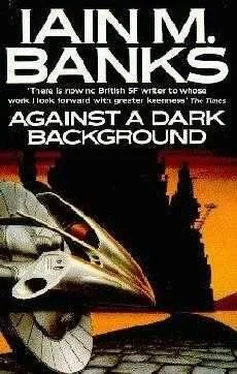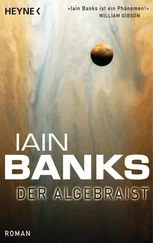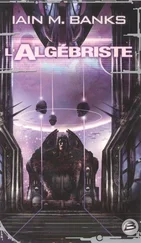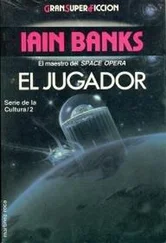Roundly cursing a heinously complex legal dispute that had grounded all charter aircraft in southern Caltasp for the past month, the CTA for having won the battle against the railroads two millennia earlier, junketeers in general and lawyers heading for conferences in particular, Sharrow took Route Five out of Udeste City.
The turnpike skirted the edge of the Seproh plateau for eighteen hundred kilometres, lanes increasing in number as road trains, buses and private cars joined from the cities on Caltasp’s eastern seaboard and the curtain-wall cliffs to the north decreased in height from nine kilometres to two.
She left the car on automatic and used its terminal to tap into data bases all over the system, catching up on news and searching out all she could on the fortunes of the Huhsz and the whereabouts of the scattered remnants of Gorko’s legacy. She dozed for an hour to some quiet music, and watched screen for a while.
She rendezvoused with a rest-mobile, ramping up into the echoing parking hold of the Air Cushion Vehicle and leaving the car for refuelling while she stretched her legs. She stood on a glassed-in walkway high in the side of the ACV, watching the distant countryside move slowly past and the northbound traffic overtaking; road trains slowly, private vehicles as though the towering hovercraft was standing still.
Back on the road, she put the automobile on manual every now and again, taking the controls and spinning the engine up to maximum while the car boomed and the cloud shadows on the road flashed underneath the turbiner’s wheels.
It was late afternoon when the turnpike bunched and swung into the Seproh Tunnel. The two-hour journey was midday bright; when the road exited to the Waist rainforests it was already dark. She signalled ahead to another rest-mobile to book a cabin and caught up with the ACV an hour later, manoeuvring the car towards it up the canyon formed by two of the parked road trains it was towing.
Just a little too tired to accept the attentions of a prettily handsome road train driver she met in the bar, she slept soundly and alone in a small, quietly humming outside cabin.
She watched desert roll past while she breakfasted. Linear cloud disappeared into the blue distance above the turnpike’s route, like sections of vapour trail.
Beyond the desert and the Callis Range came scrub, then irrigated farms; by the Big Bight the land was lush again. Late afternoon brought her to the colourful, tyre-scuffed roadsigns welcoming her to Regioner.
Regioner-like its capital, Capitaller-owed its stunningly unimaginative name to a particularly bloody interlingual dispute which had taken place so long ago one language had changed out of all recognition and the other had died entirely, outside of university language department data bases.
She left the turnpike at sunset and took a laser-straight two-laner through prairies now ripe for their second harvest, sweeping through the warm darkness of the head-heavy crops with the radio loud, singing along at the top of her lungs while the foothills of the Coastal Range rose above the plain ahead.
An hour of hill-climbing on intestinally convoluted roads, through dark tunnels and across narrow bridges, past laden orchards and around numerous towns and smaller settlements brought her to a small, prettily colour-washed, but otherwise nondescript, hill village a couple of valleys away from Capitaller.
Zefla Franck, once described by Miz Gattse Kuma as nearly two metres of utter voluptuousness with a brain, strolled from the coach stop along the lane between the low white-painted houses near the summit of the hill, her long golden hair undone and straggling to the waist of her slinky dress, her shoes off and held over one shoulder. Her head was tipped back, her long neck curved.
The night was warm. The faint breeze rising from the orchards in the valley below smelled sweet.
She whistled, and watched the sparkling sky, where Maidservant-Golter’s second moon-shone blue-grey and bounteous near the horizon; a great stone and silver ship escorted and surrounded by a school of flickering, glittering lights; habitats and factories, satellites and mirrors, and departing and arriving ships.
The ships were quick, sharp points, sometimes leaving trails; the close-orbit satellites and habitats moved smoothly, some moderately quickly, some very slowly, giving the impression that they were flecks of brightness fixed to a concentric set of clear revolving spheres; the great mirrors and most far-flung industrial and settlement orbiters hung stationary, fixed lights against the darkness.
It was, thought Zefla, really quite beautiful, and the light cast by all the various satellites, both natural and human-made, seemed soft, seductive and even-despite its icy, polar-blue pallor-somehow warm. Moonlight and junklight. Junklight. Such a callous, mean-spirited name for something so beautiful, and not even accurate. No single piece of junk was big enough to be seen from the ground, and there was little enough real junk left, anyway; it had been tidied away, swept up, captured, slowed down and dropped in and burnt off.
She watched a winking satellite move with a perfect, steady stateliness across the vault. She followed its progress as it crossed above her to vanish behind the eaves of a house on the west side of the lane, where soft lights glowed behind pastel shades and music played quietly. She recognised the tune and whistled along as she climbed some steps to a higher level of the lane. She kept her head down to make sure she didn’t trip.
She hiccuped suddenly. “Shit!” she said.
Maybe it was looking downwards that did it. She looked back up at the sky and hiccuped again. “Shit shit shit!”
She found another slowly moving satellite, and determined to ignore the stupid hiccups and concentrate on tracking the little light across the sky. Another hiccup. “Shit!”
She was nearly home and she hated going into the house with the hiccups; Dloan always made fun of her.
Another hiccup. She growled and fixed all her attention on the satellite.
Her shin hit something hard. “Aow, fuck !”
Zefla hopped around on one foot, clutching her shin. “Ow ow ow!” she said. She glared at what she’d bumped into; the moonlight, the junklight, and the warm glow from the leaves of the luminous shrubs at the door of the house revealed a huge pale car almost filling the narrow lane outside the house. Zefla glared at the insect-spattered snout of the auto and muttered.
The shoes she’d been carrying dropped from her fingers to the cobblestones; she hopped on top of the shoes, lost her footing and fell with a yelp into the luminous bushes.
She lay in the shrubbery, cradled on her back by the creaking branches and surrounded by gently glowing leaves. Disturbed insects buzzed around her head and tickled her bare legs and forearms.
“Oh, bugger,” Zefla sighed, as the door opened and her brother looked out. Another head poked out of the door, swivelling; the gaze glanced her way, then away, then back.
“Zef?” said a female voice.
“Hell’s caries,” Zefla groaned. “I might have known. I suppose this is your car?”
“Good to see you too, Zefla,” Sharrow said, smiling, as Dloan Franck came out of the doorway and offered his sister a hand. Zefla took hold and was pulled upright to stand, swaying hardly at all in front of Sharrow, who folded her arms and grinned at her.
Zefla felt Dloan dust her down and pull a few luminous leaves out of her tangled blonde hair.
“Nice car,” she said to Sharrow, as Dloan fussed and tutted, pulling a twig from the sleeve of her dress. She stood one-legged, leaning on her brother and rubbing at her bruised shin. “Thought they had collision-avoidance radar.”
“It’s switched off,” Sharrow said, stooping to retrieve Zefla’s shoes from the cobbles.
Читать дальше












